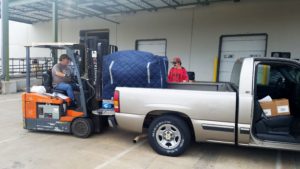
Members pick up food from the Arkansas Foodbank for the Friends and Neighbors Network alternative food pantry.
As summer 2015 commenced in Little Rock, Arkansas, Pulaski Heights Baptist Church (PHBC) was ready for something different, something authentic. The congregation knew that 17.2 percent of Arkansas residents had no clue as to where their next meal would come from given that the state has the second worst food insecurity rate in the country. But as they surveyed Little Rock’s food pantry landscape, church leaders found mostly duplications of the same transactional model, according to Mande Corbett, co-coordinator of PHBC’s Friends and Neighbors Network. Pulaski Heights congregants, on the other hand, wanted a relationship with their neighbors experiencing hunger.
“A lot of food pantries are just a transaction,” Corbett said. “Deeper relationships are just not feasible when you’re trying to reach a large amount of folks. That can get unwieldy. With that many people, it’s not practical to have much more than a transaction; so the interaction remains on the surface.”
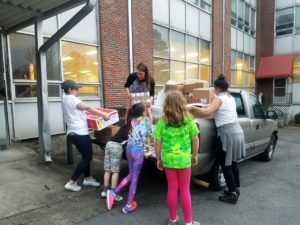
FANN member families unload food, produce and other groceries to be distributed during the monthly meeting of the network.
Corbett and her congregation persisted in their search. A recent study of Bob Lupton’s momentous book, “Toxic Charity,” which examines the effects of traditional giver-receiver charity and champions ministry that fosters mutuality, dignity and self-empowerment, had completely opened the congregation’s eyes, Corbett explained, not only to the effects of transactional giving, but to an alternative food pantry model that preserves self-respect and common ground to participants. Pulaski Heights resonated with Lupton’s model and church members approved funding that summer to create the Friends and Neighbors Network alternative food pantry, or FANN.
The FANN at PHBC now hosts up to 12 families at a time, an average of 40 adults and children, who initially pay a $5 membership fee plus dues of $3 at each meeting on the first and third Tuesdays of every month. These dues belong to FANN members who all vote on how they would like to use the accumulated dues and now have a tradition of donating 100 percent to local non-profit groups with whom they have personal connections. As the leaders of their own food network, FANN members conduct bi-weekly gatherings, order food from a local food bank, transport it to meetings, unload and distribute produce and other groceries, care for the children, and plan future meetings, all possibly by funding from another of PHBC’s ministries: Hillcrest Farmers Market. Ultimately, FANN members are building a community of support for which they retain the power and responsibility, Corbett emphasized.
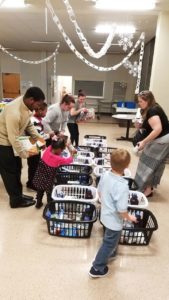
After assessing and sorting the food, members distribute it all according to family size into portions or baskets. The children enjoy helping with this.
“It’s a food pantry with dignity,” she said.
“We’ve experienced the deeper relationships that come from reaching a smaller number of folks versus casting a wider net and any fellowship remaining at surface level. That’s what really appealed to us. Our families’ dignity remains intact, and the parents and kids are empowered to be a part of something bigger than themselves but still personal and family-oriented.”
Where other food pantries may serve seniors or families in specific zip codes, FANN focuses on struggling families with young children, who need a steady supply of groceries as well as the close-knit community that FANN offers. Early on, Corbett and her co-leaders leveraged their relationships with nearby Pulaski Heights Elementary School and nonprofit partners to get in touch with single parents and struggling families in the neighborhood, most of whom receive Supplemental Nutrition Assistance Program benefits. The response from families was warm and eager, she says, especially as they took ownership of their gatherings and planned fun, engaging activities for children and adults alike.
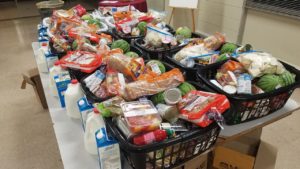
Smaller FANN families of two to four people take home one “portion” or one basket. Families of five or more people take home two.
FANN meetings can feature science lessons or art projects with the children, yoga, budgeting discussions, and gardening workshops, among anything else the group deems exciting and helpful. A popular activity at nearly every meeting is recipe swapping, Corbett said, which helps parents stay creative and inspired in their home cooking. And though meetings are vital to each family’s monthly budget and nutrition, the meetings themselves have virtually eclipsed food deliveries. FANN members genuinely enjoy being together, she added.
“This is because it’s not a transaction; it’s a time spent in relationship,” Corbett said.
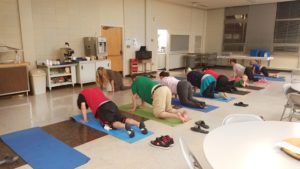
FANN meetings sometimes include a guest speaker or a workshop for member families, like this free yoga class led by Lindsay Petruk.
“We’re building real relationships and support systems, sometimes with families that don’t have roots here like others do. That support system is almost instantaneous when you walk in the door and it only grows from there. Everybody is giving to each other of themselves and then getting to take home some groceries, enabling them to put some money aside too. We want to see folks really thrive and take advantage of this opportunity.”
This article appeared in the Spring 2019 issue of fellowship! magazine, the quarterly publication of the Cooperative Baptist Fellowship. Read online here and subscribe for free to fellowship! and CBF’s weekly e-newsletter fellowship! weekly at www.cbf.net/subscribe.
The Cooperative Baptist Fellowship is a Christian Network that helps people put their faith to practice through ministry efforts, global missions and a broad community of support. The Fellowship’s mission is to serve Christians and churches as they discover and fulfill their God-given mission. Learn more at www.cbf.net.
